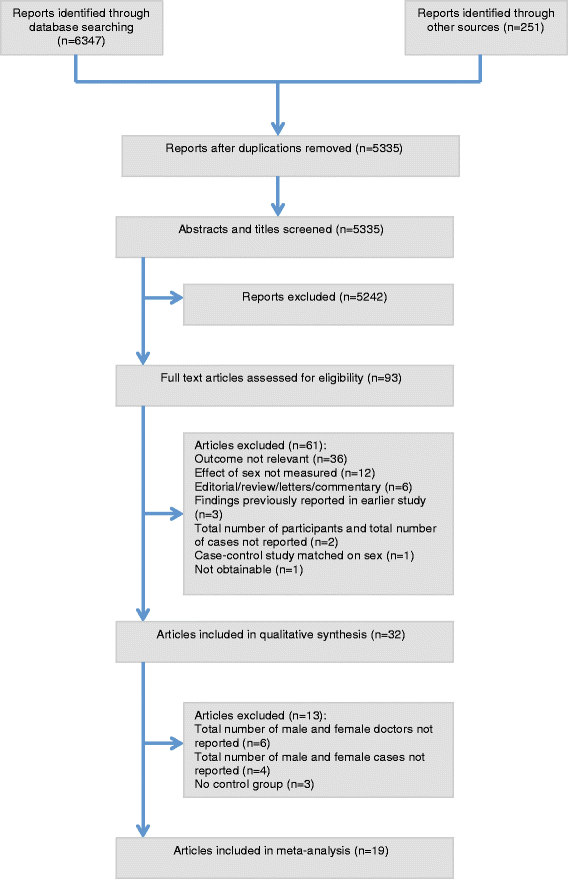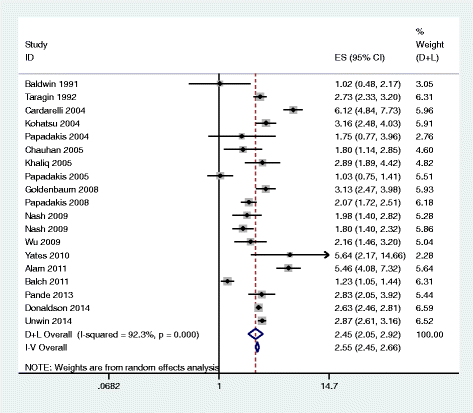Sex differences in medico-legal action against doctors: a systematic review and meta-analysis - PubMed (original) (raw)
Review
Sex differences in medico-legal action against doctors: a systematic review and meta-analysis
Emily Unwin et al. BMC Med. 2015.
Abstract
Background: The relationship between male sex and poor performance in doctors remains unclear, with high profile studies showing conflicting results. Nevertheless, it is an important first step towards understanding the causes of poor performance in doctors. This article aims to establish the robustness of the association between male sex and poor performance in doctors, internationally and over time.
Methods: The electronic databases MEDLINE, EMBASE, and PsycINFO were searched from inception to January 2015. Backward and forward citation searching was performed. Journals that yielded the majority of the eligible articles and journals in the medical education field were electronically searched, along with the conference and poster abstracts from two of the largest international medical education conferences. Studies reporting original data, written in English or French, examining the association between sex and medico-legal action against doctors were included. Two reviewers independently extracted study characteristics and outcome data from the full texts of the studies meeting the eligibility criteria. Study quality was assessed using the Newcastle-Ottawa scale. A random effect meta-analysis model was used to summarize and assess the effect of doctors' sex on medico-legal action. Extracted outcomes included disciplinary action by a medical regulatory board, malpractice experience, referral to a medical regulatory body, complaints received by a healthcare complaints body, criminal cases, and medico-legal matter with a medical defence organisation.
Results: Overall, 32 reports examining the association between doctors' sex and medico-legal action were included in the systematic review (n=4,054,551), of which 27 found that male doctors were more likely to have experienced medico-legal action. 19 reports were included in the meta-analysis (n=3,794,486, including 20,666 cases). Results showed male doctors had nearly two and a half times the odds of being subject to medico-legal action than female doctors. Heterogeneity was present in all meta-analyses.
Conclusion: Male doctors are more likely to have had experienced medico-legal actions compared to female doctors. This finding is robust internationally, across outcomes of varying severity, and over time.
Figures
Fig. 1
Flow chart showing reports retrieved, and articles excluded and included in the review based on the PRISMA Statement [10]
Fig. 2
Results of meta-analysis of 19 reports on the association between doctor’s sex and experience of medico-legal action using both fixed-effects and random-effects modelling
Similar articles
- Folic acid supplementation and malaria susceptibility and severity among people taking antifolate antimalarial drugs in endemic areas.
Crider K, Williams J, Qi YP, Gutman J, Yeung L, Mai C, Finkelstain J, Mehta S, Pons-Duran C, Menéndez C, Moraleda C, Rogers L, Daniels K, Green P. Crider K, et al. Cochrane Database Syst Rev. 2022 Feb 1;2(2022):CD014217. doi: 10.1002/14651858.CD014217. Cochrane Database Syst Rev. 2022. PMID: 36321557 Free PMC article. - Psychological morbidity in Australian doctors who have and have not experienced a medico-legal matter: cross-sectional survey.
Nash L, Daly M, Johnson M, Walter G, Walton M, Willcock S, Coulston C, van Ekert E, Tennant C. Nash L, et al. Aust N Z J Psychiatry. 2007 Nov;41(11):917-25. doi: 10.1080/00048670701634960. Aust N Z J Psychiatry. 2007. PMID: 17924245 - Personality, gender and medico-legal matters in medical practice.
Nash L, Daly M, Johnson M, Coulston C, Tennant C, van Ekert E, Walter G, Willcock S, Walton M. Nash L, et al. Australas Psychiatry. 2009 Feb;17(1):19-24. doi: 10.1080/10398560802085359. Australas Psychiatry. 2009. PMID: 18608158 - Patient characteristics of, and remedial interventions for, complaints and medico-legal claims against doctors: a rapid review of the literature.
Schultz TJ, Zhou M, Gray J, Roseleur J, Clark R, Mordaunt DA, Hibbert PD, Haysom G, Wright M. Schultz TJ, et al. Syst Rev. 2024 Apr 9;13(1):104. doi: 10.1186/s13643-024-02501-8. Syst Rev. 2024. PMID: 38594759 Free PMC article. Review. - Doctors or mid-level providers for abortion.
Barnard S, Kim C, Park MH, Ngo TD. Barnard S, et al. Cochrane Database Syst Rev. 2015 Jul 27;2015(7):CD011242. doi: 10.1002/14651858.CD011242.pub2. Cochrane Database Syst Rev. 2015. PMID: 26214844 Free PMC article. Review.
Cited by
- Will I lose my license for that? A closer look at Canadian disciplinary hearings and what it means for pharmacists' practice to full scope.
Foong EA, Grindrod KA, Houle SKD. Foong EA, et al. Can Pharm J (Ott). 2018 Aug 17;151(5):332-344. doi: 10.1177/1715163518790773. eCollection 2018 Sep-Oct. Can Pharm J (Ott). 2018. PMID: 31080533 Free PMC article. - Risk identification and prediction of complaints and misconduct against health practitioners: a scoping review.
Wang Y, Ram SS, Scahill S. Wang Y, et al. Int J Qual Health Care. 2024 Jan 13;36(1):mzad114. doi: 10.1093/intqhc/mzad114. Int J Qual Health Care. 2024. PMID: 38155372 Free PMC article. Review. - Physician factors associated with increased risk for complaints in primary care emergency services: a case - control study.
Bratland SZ, Baste V, Steen K, Diaz E, Gjelstad S, Bondevik GT. Bratland SZ, et al. BMC Fam Pract. 2020 Sep 25;21(1):201. doi: 10.1186/s12875-020-01272-0. BMC Fam Pract. 2020. PMID: 32977768 Free PMC article. - Effect of sex on specialty training application outcomes: a longitudinal administrative data study of UK medical graduates.
Woolf K, Jayaweera H, Unwin E, Keshwani K, Valerio C, Potts H. Woolf K, et al. BMJ Open. 2019 Mar 5;9(3):e025004. doi: 10.1136/bmjopen-2018-025004. BMJ Open. 2019. PMID: 30837254 Free PMC article. - Physician Workforce Disparities and Patient Care: A Narrative Review.
Silver JK, Bean AC, Slocum C, Poorman JA, Tenforde A, Blauwet CA, Kirch RA, Parekh R, Amonoo HL, Zafonte R, Osterbur D. Silver JK, et al. Health Equity. 2019 Jul 1;3(1):360-377. doi: 10.1089/heq.2019.0040. eCollection 2019. Health Equity. 2019. PMID: 31312783 Free PMC article. Review.
References
- General Medical Council. The state of medical education and practice in the UK. London: GMC; 2014.
- Federation of State Medical Boards. U.S. Medical Regulatory Trends and Actions.Federation of State Medical Boards; 2014.
- Archer J, Regan de Bere S, Bryce M, Nunn S, Lynn N, Coombes L, et al. Understanding the rise in Fitness to Practise complaints from members of the public. Plymouth: Plymouth University; 2014.
Publication types
MeSH terms
LinkOut - more resources
Full Text Sources
Other Literature Sources

